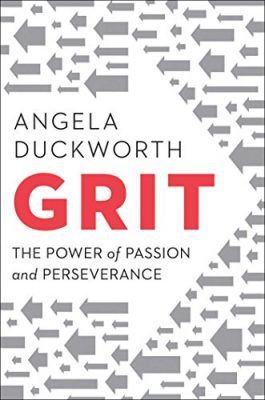
“To be gritty is to keep putting one foot in front of the other. To be gritty is to hold fast to an interesting and purposeful goal. To be gritty is to invest, day after week after year, in challenging practice. To be gritty is to fall down seven times, and rise eight.”
Grit looks at what makes successful people, raw talent or passion and perseverance. Angela has tons of research that looks at this question and has created a Grit Scale to determine how much “grit” a person has. It appears that perseverance is the key factor in determining success. She found that people who graduated with a 2 year college degree scored slightly higher than people with a 4 year degree. What? Turns out that the drop out rate at 2 year colleges is much higher so that people who actually DO graduate must have more grit.
It is a book filled with quotes like “Our potential is one thing. What we do with it is quite another.” and “years of hard work are often mistaken for innate talent, and that passion is as necessary as perseverance to work-class excellence.”
Other key factors are that each person must have a parent, teacher, or other adult who believes in their potential and tells them and supports them.
I love her story about Warren Buffet’s 3 step process of focusing on a smaller number of important goals in order to be successful. First, you write down 25 career goals. Second, you circle the top five highest-priority goals. Third, you look at all the rest of the goals and avoid them at all costs because they distract you and eat away at your time / energy. Wow… focusing your efforts is a key piece to this ‘grit’ thing I guess.
The ‘paragons of grit’ all have 4 things in common. An interest in the topic, long periods of practice, with a purpose that what you do matters. I feel like this is why I love the career field so much. It clearly has all four of these to keep me going and learning. The fourth one is hope. Hope is defined in all of the three above. It is what keeps you going even when things are difficult.
Another of the key ingredients is that action is required. If you know me, you’ll know that I speak to this all the time in my “intentional serendipity” philosophy. You must take action in order to learn. Turns out you need to take action in order to develop your interests as well.
This book has been a thoughtful journey as I work with clients who are looking for passion in a job. I don’t think passion comes first as much as it comes from hard work.
Jim Peacock is the Principal at Peak-Careers Consulting and writes a monthly newsletter for career practitioners. Peak-Careers offers discussion-based online seminars for career practitioners focused on meeting continuing education needs for GCDF and BCC certified professionals as well as workshops for career practitioners and individual career coaching.
Sign up for our monthly newsletter at www.Peak-Careers.com


Leave a Reply